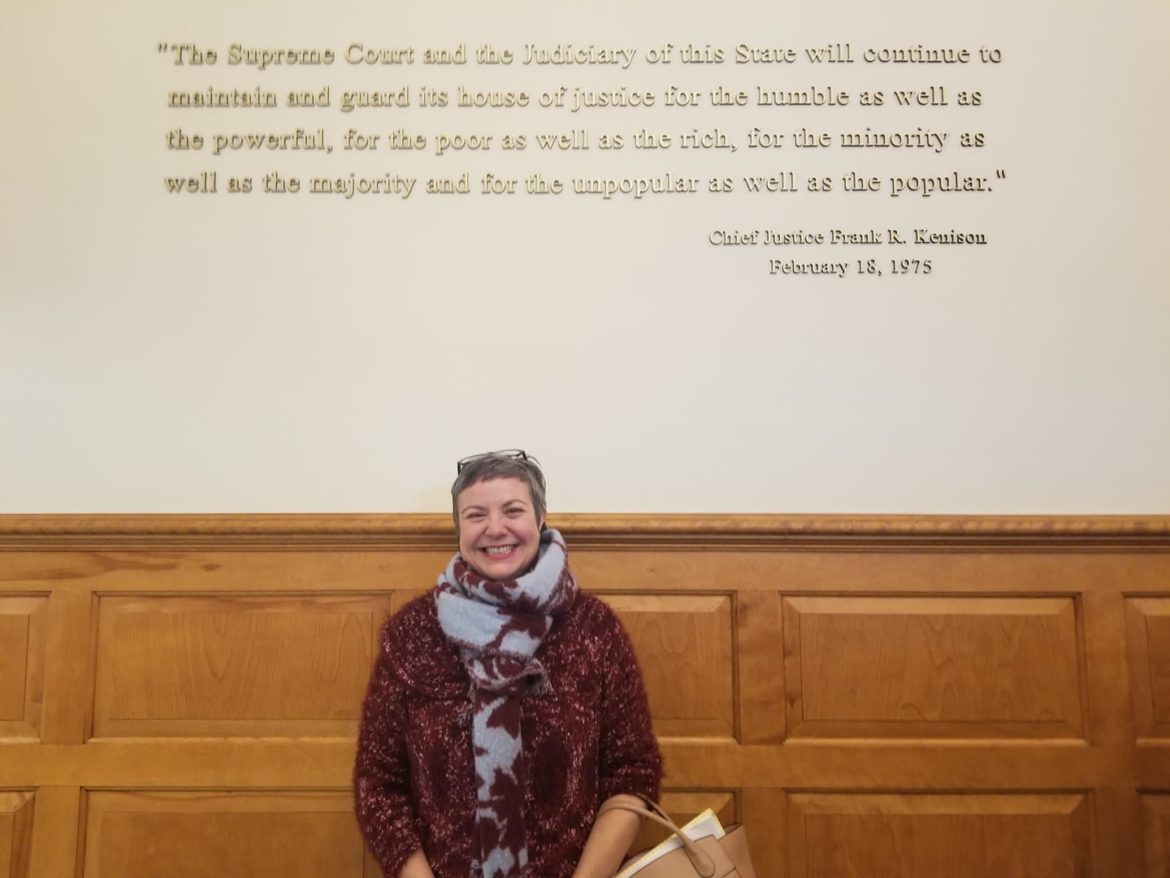Art.] 8. [Accountability of Magistrates and Officers; Public’s Right to Know.] All power residing originally in, and being derived from, the people, all the magistrates and officers of government are their substitutes and agents, and at all times accountable to them. Government, therefore, should be open, accessible, accountable and responsive. To that end, the public’s right of access to governmental proceedings and records shall not be unreasonably restricted. The public also has a right to an orderly, lawful, and accountable government. Therefore, any individual taxpayer eligible to vote in the State, shall have standing to petition the Superior Court to declare whether the State or political subdivision in which the taxpayer resides has spent, or has approved spending, public funds in violation of a law, ordinance, or constitutional provision. In such a case, the taxpayer shall not have to demonstrate that his or her personal rights were impaired or prejudiced beyond his or her status as a taxpayer. However, this right shall not apply when the challenged governmental action is the subject of a judicial or administrative decision from which there is a right of appeal by statute or otherwise by the parties to that proceeding.
June 2, 1784
Amended 1976 by providing right of access to governmental proceedings and records
Amended 2018 by providing that taxpayers have standing to bring actions against the government
Three important Right-to-Know cases were heard yesterday at the NH Supreme Court. You can read Mark Hayward of the Union Leader’s take here, Justices Review Law that Keeps Records of Official Misconduct Secret, the Monitor here, and In-Depth NH here, but basically, in all three cases, the government argues they have the right to hide personnel misconduct from the public.
They base their arguments on the 1993 case, Union Leader vs. Fenniman, which all open government proponents believe was wrongly decided, and which is now being used to shield legitimate information pertaining to government employees from the public eye. To put that in context, yesterday, the government lawyers went so far as to argue there is no public interest in knowing *who individuals* accused of misconduct are…
This is particularly galling when you consider that one of the profound challenges we face in holding public officials accountable is when, by some miracle, shady public employees are removed from one jurisdiction, they often resurface to continue their malfeasance elsewhere. How do we protect our cities, towns, and villages from these repeat offenders? How do you hold someone accountable if you don’t know who they are?
Just ask Laurie Ortolano of Nashua, who spent more than $1,000 to determine the Nashua tax assessor wasn’t doing his job. She built such a strong case that this assessor was forced to leave his position in Nashua, only to… dundundun… resurface in… Hooksett (sorry to inform you, Hooksett taxpayers). This is just one example of why knowing who the individual is, not simply hiding behind an anonymous monolithic facade called “the state,” is so important.
The world is, after all, made up of INDIVIDUALS doing good and bad things. If you work for the state, and you do bad things, you don’t get to hide behind the cloak of the state: we have a right-to-know who and what YOU are, what YOU are doing. Because, in the end, what do you think creates better incentives for better behavior over time: A system that says, “We’ll cover (and cover, and cover) for you when you do something wrong,” or a system that says, “Sunlight is the best disinfectant”?
In response to Ortolano’s experience, Democrat Representative Jan Schmidt from Nashua is proposing several amendments to the current RSA 91-A law. Schmidt and Ortolano both attended a meeting on Saturday with Right-to-Know NH, a nonpartisan coalition of open government advocates.
At this meeting, Schmidt claimed her proposed amendments will help citizens like Ortolano. Schmidt is either woefully misinformed, or lying, because it is simply impossible to interpret her proposed amendments as favorable to open and transparent government. In fact, one proposed amendment strikes a roll call requirement (our only way to know who voted for what), and another adds thousands of dollars in taxpayer fees to the RTK process.
“We are totally opposed to it,” David Saad, president of RTKNH, said on Wednesday. “Part of our mission is to have more open and transparent government. What we have been fighting for since 2013 is to make minor changes to the law so that everyone has a right to inspect records at no cost. “Once you create a financial barrier to an individual to view public records and charge them in any way to view those records, you are creating a financial barrier which is going to be used maliciously by some public officials to thwart the public’s right to know,” said Saad. Schmidt did not return phone calls and emails seeking comment on the bill.
Union Leader
The main thrust of questioning by the Justices yesterday had to do with Fenniman, with most of the judges asking what would happen if this decision was overruled. As a lawyer, I empathize when judges have to overrule a previous decision, but just as you need sunlight for disinfectant, you need to be open to the fact that sometimes, you get it wrong, suck it up, and do the right thing. And with Fenniman, it is crystal clear that the unintended and damaging consequences to government accountability and transparency far outweigh sticking to stare decisis.
“We believe that this position is deeply harmful to government accountability and is inconsistent with Chapter 91-A’s presumption in favor of disclosure,” Bissonnette said. “It’s crystallized to me when I think about the examples of documents that would be categorically excluded under Fenniman. Number one, an internal report documenting a school district’s potential failures in investigating sexual misconduct against students by a teacher.”
From Concord Monitor
The Court’s best bet for a good outcome for the people of New Hampshire is to overturn Fenniman and apply a balancing act when considering what information, if any, should be redacted from public record requests. As Greg Sullivan, attorney for the Union Leader, who also argued Fenniman in 1993, said yesterday to laughs all round: “I’m here to blame the court… Fenniman… was wrong then. It’s wrong now.”
The Justices have an opportunity to right a serious wrong. I hope they have the courage to do what’s right for our Right-to-Know, and stand with the people for open, accessible, accountable and responsive government.


